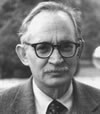
>President's
Column
>Catalyst
>Preserving
Records
>Science
and the Public
>IUPAC
Forum
>IUPAC
News
>Awards
>IUPAC
Projects
>Highlights
from PAC
>New
Books
>Reports
from Conferences
>Web
Reviews
>Conference
Announcements
>Conference
Calendar
Download the January
issue in pdf format.
(1.91 MB)
Chemistry International
Vol. 24, No. 1
January 2002
Awards and Honors
Allen Bard Awarded the ACS' Priestley Medal
The American Chemical Society awarded its highest honor, the 2002 Priestley Medal, to Professor Allen J. Bard of the University of Texas, Austin. Many IUPAC members know Al Bard personally, especially those who were active between 1991-93, when he was President and deeply involved in restructuring the organization. While the Priestley Medal recognizes his distinguished service to chemistry, Dr. Bard is also best know for his research in electrochemistry, from fundamental understanding to the develpment of unique techniques, such as scanning electrochemical microscopy. More than having a "pure and applied" approach to science, Bard also promotes the teaching of the field. During his outstanding service as editor in chief of the Journal of the American Chemical Society, he served the community by meticulously screening the best scientific reports for publication in this journal of broad interest. It is not surprising, therefore, that Bard is also well known as an elder statesman of the profession who has done much to advance its global influence.CI spoke with him about what he would like today's IUPAC leaders to accomplish.
CI: What are some of the greatest opportunities for IUPAC ?
AB: I think there are a lot of problems in the fundamental and applied sciences . . . and political problems . . . that IUPAC can play a role in solving. IUPAC can address such global problems as the environment, energy, and water resources on a more international scale than even large countries can by themselves. In fundamental chemistry, IUPAC is poised now to make important and widely recognized contributions in nanoscience, molecular electronics, materials science, and other areas.
CI: What about recognition for IUPAC itself?
AB: If IUPAC does important work and addresses problems significant to industries and governments, it will be recognized. The key issue is, how important is IUPAC and what it's doing? If members come out with good reports that back up their views on important issues, I think they will be publicized.
CI: As President of IUPAC, you strongly encouraged restructuring in order to focus resources on high-priority projects. Does the current structure achieve what you had hoped for?
AB: It's a question of timing and the speed of getting things out. The tradition of IUPAC had been to do very careful, very good work at a leisurely pace. So it spent four or six or even eight years to address fairly non-critical problems. Clearly, in today's faster-paced world, that's not good enough for addressing problems people care about. The new structure is better. It's attuned to identifying a problem through, let's say, the divisional structure, rapidly getting together a group that can address that problem, and giving them the support to complete the study in a relatively short time. The key issue is to identify an important project and get the best people who are willing to work on it — and I think good people will be willing to work on an important project. Give them the resources to meet a few times–not just once every two years–and let them publish their report in a timely manner.
CI: Speaking of resources, what can IUPAC do to address disparities in resources and standards among member countries?
AB: In terms of resources, I don't think IUPAC can make a very big difference, but it can — and does — play a role in establishing world-wide standards and making these standards clear to developing countries. IUPAC could perhaps try to leverage its funding by doing collaborative studies with other international organizations.
CI: With so many multidisciplinary issues in the sciences, would your suggestion to collaborate with other organizations possibly broaden IUPAC's professional base as well?
AB: That's right. Various organizations–UNESCO and others–are concerned with interdisciplinary problems that are within the broad scope of IUPAC . We ought to be working more closely and more frequently with them on a wide range of cross-cutting issues.
News
and Notices - Organizations and People
- Standing Committees
Divisions
- Projects - Reports
- Publications - Symposia
- AMP - Links
Page last modified 20 December 2001.
Copyright © 1997-2001 International Union of Pure and Applied Chemistry.
Questions or comments about IUPAC, please
contact the Secretariat.
Questions regarding the website, please contact [email protected]

